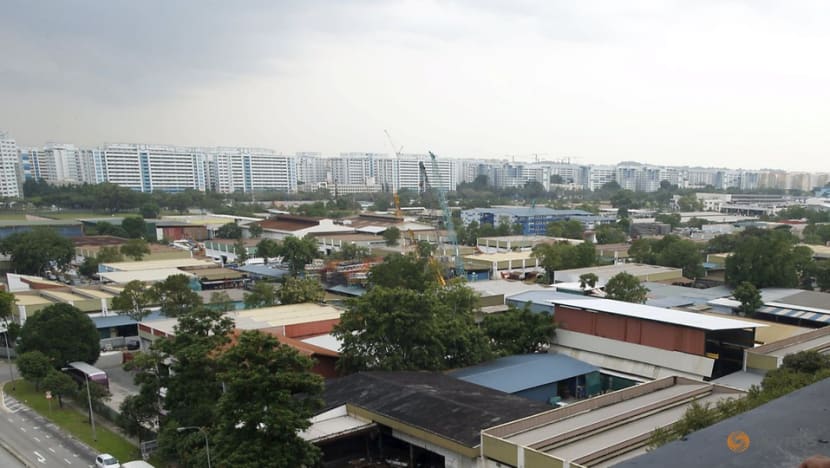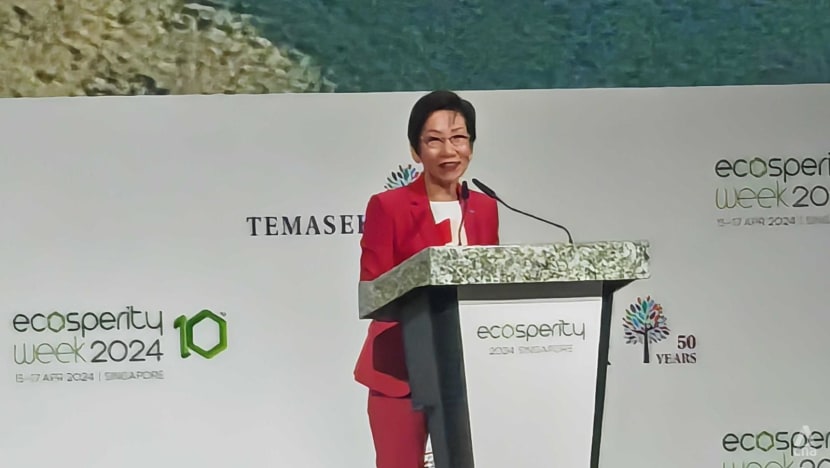New registry for Singapore businesses to track and report carbon emissions launched
The Emission Factors Registry is meant to help businesses meet their climate reporting needs.

A cluster of factories at an industrial park in Singapore. (Photo: Reuters)

This audio is generated by an AI tool.
SINGAPORE: The Singapore Business Federation (SBF) launched a registry on Monday (Apr 15) to help local businesses track and report their carbon emissions more easily and accurately.
The Emission Factors Registry is meant to help businesses meet their climate reporting needs, said Minister for Sustainability and the Environment Grace Fu, who announced the registry's launch at the opening of Ecosperity Week 2024.
The annual sustainability conference by Temasek, which runs until Wednesday, brings together private and public sector leaders, academics and other parties to further the agenda on sustainable development.
The Emission Factors Registry is a joint effort between the SBF, Agency for Science, Technology and Research (A*STAR), PricewaterhouseCoopers (PwC) and Singtel, and supported by the Ministry of Trade and Industry and the Ministry of Sustainability and the Environment.

"The idea of the registry emerged from a Forward SG conversation in 2022, where companies highlighted the difficulties presented in reporting scope 3 emissions," Ms Fu, who is also Minister-in-charge of Trade Relations, noted in her keynote address.
Scope 3 emissions typically refer to indirect emissions from entities up and down a company’s value chain, such as business travel, commuting, waste disposal and water consumption.
The registry works by capturing a database of emission factors developed based on Singapore’s context. These emission factors will convert operational data from business activities into corresponding greenhouse gas emissions.
In a separate press release, the SBF said that the registry supports existing reporting tools and solutions that help enterprises automate their sustainability reporting process.
It added that most Singapore businesses currently use emission factors from international sources for sustainability and carbon emissions reporting, especially for scope 3 emissions.
"The Singapore Emission Factors Registry which contains localised emission factors will help Singapore-based businesses to track and report their emissions more accurately, and in turn, empower businesses to make informed decisions on how to reduce their carbon footprint based on their environmental impact," the federation said.
The emission factors will be developed in phases. An initial baseload with data collected and consolidated from government agencies will be ready by the end of this year.
These include emission factors related to transportation, water, general waste, and energy. Emission factors for new categories and activities will be developed and released based on industry consultations and demand.
The registry comes ahead of Singapore's requirement for all listed companies to make climate-related disclosures from financial year (FY) 2025. Large non-listed companies will be required to do so from FY2027.
Disclosures will need to be aligned with the standards set out by the International Sustainability Standards Board, a global accounting standards body.
"It is important to help our businesses to understand and measure their carbon footprint, and integrate sustainability into their management frameworks systematically," said Ms Fu.
Climate reporting, including disclosure of companies' climate-related data, such as carbon emissions, will enable consumers, investors and financiers to make more informed choices in their purchases and investments. They will be able to direct their finances to businesses with strong sustainability practices.
Related:
TRAINING WORKERS IN 'GREEN SKILLS'
Ms Fu also spoke of the importance of training workers to have the relevant skills to support the country's climate action.
The Green Skills Committee, convened last year, is focusing on areas where green skills are in high demand and will remain so in the immediate and near term. Examples include clean energy and sustainability reporting and assurance.
"We have witnessed initiatives by private companies, trade associations and institutes of higher learning, who have rolled out several programmes and courses in collaboration with government agencies," Ms Fu said.
The Energy Market Authority, for example, has been working with training providers to launch programmes that can address clean energy skills gaps identified by the industry, such as the safe handling of energy storage systems.
While government policies and incentives were crucial catalysts for decarbonisation, Singapore also needs a vibrant marketplace of ideas, robust financing mechanisms, and strong international partnerships, Ms Fu said.
"We need everyone ... governments, businesses, and civil society, to embrace a culture of sustainability, hold each other accountable for progress, and propel us on to a green and prosperous future," she added.

















